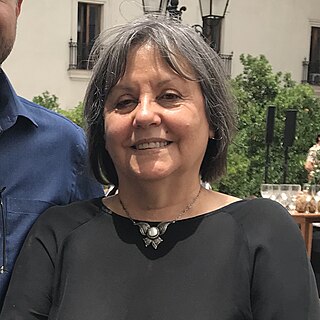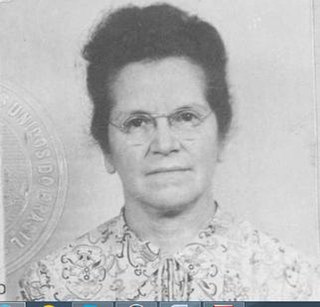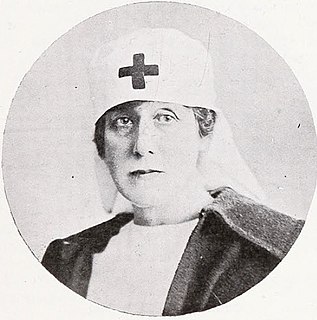
Alicia Herrera Rivera (May 12, 1928 - April 6, 2013) was a Chilean feminist lawyer and minister of the Court of Appeals of Santiago.

Alicia Herrera Rivera (May 12, 1928 - April 6, 2013) was a Chilean feminist lawyer and minister of the Court of Appeals of Santiago.
Alicia Herrera Rivera was born in Valparaíso, May 12, 1928. She believed that her origin in the seaport town deeply determined her way of being and her own history. She grew up enjoying reading, music and studies. Both she and her three sisters and two of her brothers were raised in an environment of respect, solidarity and humanism where the freedom and trust granted by her parents forged her determined and independent personality . [1]
She studied law at the University of Santiago, Chile, where she graduated in 1954. [2] A month later, she married the lawyer and socialist politician, Alejandro Jiliberto Zepeda.
After Pinochet's 1973 Chilean coup d'état, she suffered dictatorial oppression, was the victim of kidnapping by agents of the Dirección de Inteligencia Nacional (DINA), and was finally forced into exile in Europe, living in Romania, East Germany, and finally, in Spain.
A pioneer in the fight for the rights against mistreatment and discrimination of women, Rivera and a group of lawyers co-founded, in 1987, the Asociación de Mujeres Juristas Themis (Association of Women Jurists Themis), dedicated to promoting gender equality and make the constitutional principle of legal protection of women's rights a reality. [3]
In March 1987, Pinochet issued several decrees granting authorization to return to Chile for some exiles. Among the lists appeared the name of Alicia Herrera Rivera, who flew to Santiago on April 3, twelve years after she left for exile. After spending a season there, she participated in the 1988 Chilean national plebiscite, in which the "No to Pinochet" triumphed. After that, Alicia Herrera returned to Spain convinced that her return to Chile would soon become a reality and forever. Rivera died on April 6, 2013, in Santiago. [2]
In 2000, as honorary president of Themis, she was awarded the Silver Cross of the Civil Order of Social Solidarity of the Ministry of Labor. [4]

Diamela Eltit is a Chilean writer and university professor. She is a recipient of the National Prize for Literature.
Jaime Castillo Velasco was a Chilean politician who served as president and vice-president of the Christian Democrat Party on several occasions.

Chilean literature refers to all written or literary work produced in Chile or by Chilean writers. The literature of Chile is usually written in Spanish. Chile has a rich literary tradition and has been home to two Nobel prize winners, the poets Gabriela Mistral and Pablo Neruda. It has also seen three winners of the Miguel de Cervantes Prize, considered one of the most important Spanish language literature prizes: the novelist, journalist and diplomat Jorge Edwards (1998), and the poets Gonzalo Rojas (2003) and Nicanor Parra (2011).

Carla Guelfenbein Dobry is a Chilean writer, winner of the Alfaguara Novel Prize in 2015 for her book Contigo en la distancia. Guelfenbein has published six novels; The most recent one is called La estación de las mujeres and it was published in April 2019.

Elena Caffarena Morice was a Chilean lawyer, jurist and politician. Contemporary historians and humanists consider her to be one of the most important 20th-century public figures in Chile.
Aurora Argomedo (died 1948 in was a Chilean politician, feminist and activist, best known for her work on behalf of women's rights in Chile. She participated actively in the educational reforms of the 1910s and 1920s.

María Rivera Urquieta was a Chilean professor and feminist. She was one of the founding members of the Pro-Emancipation Movement of Chilean Women. She was a lecturer for the Chilean Federation of Feminine Institutions and led one of the conference meetings at the Primer Congreso Interamericano de Mujeres held in Guatemala City, Guatemala in 1947.

Aída Parada Hernández was a Chilean educator, feminist, founding member of Movimiento Pro-Emancipación de las Mujeres de Chile and the first Chilean delegate to the Inter-American Commission of Women.

María Julieta Kirkwood Bañados was a Chilean sociologist, political scientist, university professor and feminist activist. She is considered one of the founders and impellers of the Chilean feminist movement in the 1980s. She is considered the forerunner of Gender studies in Chile.

Marta Vergara Varas was a Chilean author, editor, journalist and women's rights activist. Introduced to international feminism in 1930, she became instrumental in the development of the Inter-American Commission of Women (CIM) helping gather documentation on laws which effected women's nationality. She pushed Doris Stevens to broaden the scope of international feminism to include working women's issues in the quest for equality. A founding member of the Pro-Emancipation Movement of Chilean Women, she was editor of its monthly bulletin La Mujer Nueva. When she was ousted from the Communist Party she moved to Europe and worked as a journalist during the war. At war's end, she returned to Washington, D.C. and worked at the CIM continuing to press for women's suffrage and equality, before returning to Chile, where she resumed her writing career.
Matilde Throup Sepúlveda was the first Chilean woman to receive the title of attorney, and the third to obtain a professional title after the institution of the Decreto Amunátegui of 1877 which allowed women to be admitted to universities.
Pro-Emancipation Movement of Chilean Women was both a historic women's rights organization, which pressed for equality between 1935 and 1953 and a current umbrella organization reorganized in 1983 to organize other women's organizations to provide unity in the struggle for the country to return to democracy. Once the dictatorship was overturned the NGO turned their focus to uniting organizations which pursue a broad spectrum of issues pertaining to women's rights and development.
Sofía Sara Hübner Bezanilla, also known as Sara Hübner de Fresno and by her literary pseudonym Magda Sudermann, was a Chilean feminist writer, journalist, and editor.

Sofía Eastman Cox, also known as Sofía Eastman de Huneeus, was a Chilean feminist writer and socialite. In 1915, she was a founder and president of the Ladies' Reading Circle, one of the first women's groups in Chile, dedicated "to promote and cultivate letters and the arts from the point of view of reception and production, and to improve the quality of education received by women." She also held the presidency of the Chilean Women's Red Cross from 1918 to 1921, an institution of which she was also one of the main benefactors and managers.
Angelina Vásquez is a Chilean documentary filmmaker who was exiled to Finland following the 1973 Chilean coup but returned to film clandestinely during the Pinochet dictatorship in the early 1980s. Like Marilú Mallet in Canada and Valeria Sarmiento in France, she is notable as one of the first Chilean women film directors, emerging in the early 1970s but producing most of her work in exile.
Luz Donoso Puelma, also known as Luz Donoso, was a Chilean graphic artist, muralist, political activist, and teacher. Beginning in the mid 1960s, Donoso was one of the most prominent participants in the muralist movement that supported Salvador Allende’s presidential campaign. In the first months of the dictatorship she was dismissed from her teaching position at the University of Chile, like many of her colleagues, and shortly after co-founded an artist run work space and forum, Taller de Artes Visuales (TAV).

Graciela Huinao is a Mapuche poet and fiction writer. Huinao, who writes in Spanish, is the first Indigenous woman to join the Academia Chilena de la Lengua.

Elvira Hernández is a Chilean poet, essayist, and literary critic.

Celinda Arregui de Rodicio was a Chilean feminist politician, writer, teacher and suffrage activist best known for her work in favor of the rights of women in the political, social and civil spheres in Chile.
Sylvia Soublette Asmussen was a Chilean composer, singer, choirmaster and educator. She won the 1964 Elizabeth Sprague Coolidge Gold Medal, the 1997 Critics Award from the Valparaíso Art Critics Circle, the 1998 music medal from the National Music Council, and the Pablo Neruda Order of Artistic and Cultural Merit, which was awarded posthumously. She published and performed under the name Sylvia Soublette.